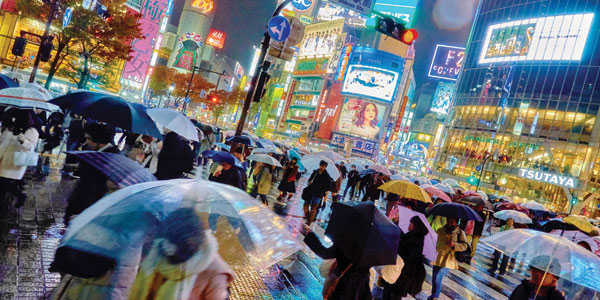
TOKIO, Japón — Después de tantos gritos e insultos en la campaña por la presidencia de Estados Unidos, necesitaba un antídoto. Así que decidí pasarme 10 días en uno de los países más corteses y con mejores modales del mundo: Japón.
Tokio, su capital, es una urbe de 13 millones de habitantes (o 38 millónes si sumamos las zonas aledañas) pero hay momentos en que, si cierras los ojos, te la puedes imaginar casi vacía. El silencio es una forma de respeto de los japoneses. Los vagones de su cronométrico metro, generalmente repletos, no van cargados de música ni de conversaciones en voz alta.
Pasé mis vacaciones sin oír un cuerno en las calles de Tokio. La explicación de una guía japonesa me impresionó: “Siempre pensamos en lo que el otro está sintiendo.” No puedo imaginarme a los taxistas y conductores en Nueva York, en la Ciudad de México o en Buenos Aires con la misma actitud. Quizás es algo que comen aquí.
Empecemos por las porciones. Mínimas, en comparación a nuestras costumbres occidentales. La obesidad que nos atormenta en México y Estados Unidos es prácticamente inexistente aquí. Rodeados de mar, su dieta está basada en pescado y, si me permiten la observación, en un ritmo mucho más natural y lento para comer. Dicen los expertos que hay que darle tiempo al cerebro para que sepa que el estómago está lleno y aquí se lo dan.
Los saludos y despedidas son largos y elaborados, con caravanas a distintos ángulos y multitud de expresiones de disculpa y agradecimiento. Sus filas son impecables; a nadie se le ocurriría saltarse una. El honor es más importante que perder la paciencia. Las reglas se cumplen. Vi calles vacías con cientos de peatones esperando en las banquetas la señal de caminar.
En un cartel de la tradicional y fascinante ciudad de Kyoto, se resumían así sus estrictas prácticas de conducta en público: no comer mientras caminas, no fumar, no sentarse en el piso, no tomarse selfies, no tocar a las geishas y no tirar basura.
En un centro comercial me costó trabajo encontrar un basurero. Esto tiene dos explicaciones. Una, de seguridad: Sin basureros es más difícil esconder bombas en lugares públicos. Y dos, la idea de que tu basura es tuya y es tu responsabilidad llevártela a casa o cargarla hasta encontrar el sitio apropiado para desecharla.
Los niños japoneses pasan 15 o 20 minutos al final del día limpiando sus salones de clases y escuelas. Esa misma costumbre se extiende al resto de la sociedad. Vi a un empleado limpiar con esmero una mancha de chicle en la calle y al chef de sushi lavarse varias veces las manos antes de cortar milimétricamente su sashimi.
La convivencia en Japón parece basarse en orden, tradición y limpieza. Muchos hogares japoneses tienen retretes automáticos, igual que los que vi en restaurantes, aviones, trenes y hoteles. Cada vez que entraba al baño me recibía el retrete con entusiasmo, levantando su tapa y ofreciéndome un menú de opciones en cada sentada. Imagínense un “carwash” pero para el trasero, desde lavado, secado, rociada aromatizante, masaje y todo en la comodidad de un semicírculo a la temperatura deseada.
Es un verdadero trono moderno que también tiene su explicación. Ante la falta de espacio en los apartamentos japoneses, donde las separaciones de madera y papel no dan privacidad, había que reinventar y hacer más placentero ese efímero momento de privacidad en el baño.
En sus calles Japón tiene uno de los niveles de criminalidad más bajos del mundo. Sentí palpitaciones cuando dos mujeres dejaban sus bolsas colgadas en la silla de un restaurante para ir al baño. Al regresar, las bolsas seguían ahí, intactas. Jamás se les ocurrió pensar que alguien se las robaría en un lugar público. A mí sí.
Claro, Japón también tiene sus problemas. La economía está casi estancada y hay una grave crisis de suicidios. Pero para los que visitamos por solo unos días, es un verdadero oasis ante los excesos y groserías de la vida moderna en otros países.
Japón está 14 horas adelante del horario de mi casa en Miami, y me he pasado una buena de parte del viaje como en la película “Lost in Translation”:peleando con el “jet lag”, despertando en la madrugada y bostezando de día. Pero, sobre todo, sorprendiéndome de las maravillas que provoca la cortesía japonesa. Algo mágico ocurre cuando las cosas funcionan y el respeto impera.
Es, sin duda, el antídoto que necesitaba. A ver cuánto me dura.
(Jorge Ramos, periodista ganador del Emmy, es el principal director de noticias de Univision Network. Ramos, nacido en México, es autor de nueve libros de grandes ventas, el más reciente de los cuales es “A Country for All: An Immigrant Manifesto”.)
Japan, as an Antidote
TOKYO — After all the shouting and name calling that occurred during the presidential campaign in the United States, I needed an antidote. So I decided to spend 10 days in one of the world’s most polite countries: Japan.
Tokyo, the capital, has 13 million inhabitants (or 38 million if you include the metro area), but there are moments when, if you close your eyes, you can picture an almost empty city. Among the Japanese, silence is a form of respect. In their perfectly synchronized subway, for instance, the cars, while usually crowded, are free from music and loud talk.
I spent my vacation in Tokyo without hearing cars honking. A Japanese guide’s explanation for this amazed me: “We always consider what other people may be feeling.” I can’t imagine taxi drivers and motorists in New York, Mexico City or Buenos Aires with that kind of attitude.
Perhaps it’s the food. In Japan, serving sizes are minimal, compared to our Western ones. The obesity epidemic that plagues us in Mexico and the United States is virtually nonexistent here. In this nation, the average diet is based on fish. And, if I may say so, the Japanese eat at a much slower, more natural pace than Westerners. Experts say that the brain needs time to realize that the stomach is full — and the Japanese take their time.
Greetings and farewells are long and elaborate, with bows at different angles and a host of expressions of gratitude. And no one would ever think of cutting in a line. Honor matters; rules are obeyed. Even in streets where car traffic was light, I saw crowds of pedestrians waiting at the curb for the “walk” sign.
In Kyoto, I saw a poster that listed rules for public behavior: Don’t eat while walking. No smoking. Don’t sit on the grass. No selfies. Don’t touch the geishas. No littering.
I had a hard time finding a trash bin in a mall. I see two possible explanations. First, security reasons: Without trash bins, it’s harder to hide bombs in public places. And second, the notion that your trash is yours and that it’s your responsibility to take it with you until you find the right place to dispose of it.
I was told that Japanese kids spend 15 to 20 minutes at the end of the day cleaning their classrooms and schools. The same practice extends to the rest of the society. I saw a city employee cleaning up a bubble gum stain on the street and a sushi chef washing his hands several times before slicing sashimi by the millimeter.
Coexistence seems to be based on order, tradition and cleanliness. Many Japanese homes have automatic toilets, as do restaurants and other businesses. Every time I stepped into a restroom, I was greeted by an enthusiastic toilet that raised its lid and offered me a menu of comfort options. This veritable throne for the modern age also has an explanation: In apartments, where the wood-and-paper “walls” don’t allow much privacy, the Japanese had to reinvent and make more pleasant that ephemeral moment alone.
Japan also has one of the lowest crime rates in the world. While dining in a restaurant, I was alarmed when I saw two women leaving their purses on their chairs while they went to the restroom. When they returned, their purses were still there, untouched. The idea of purse snatching clearly never crossed their minds.
Of course, no place is perfect, and Japan has its problems. The economy is stagnant, and there is a suicide crisis in the country. But for those who visit for a few days, it’s an oasis amid the excess and crassness of modern life in other countries.
Japan is 14 hours ahead of my time zone in Miami, and I spent a good portion of this trip like Bill Murray’s character in “Lost in Translation”: fighting jet lag, waking at the break of dawn and yawning in the daytime. But, above all, I marveled at the wonders that Japanese politeness evokes. Magic happens when things work and respect reigns.
After a long, grueling election, this was the antidote I needed. We’ll see how long the bliss lasts.
(Jorge Ramos, an Emmy Award-winning journalist, is a news anchor on Univision and the host of “America With Jorge Ramos” on Fusion. Originally from Mexico and now based in Florida, Ramos is the author of several best-selling books. His latest is “Take a Stand: Lessons From Rebels.” Email him at jorge.ramos@nytimes.com.)









